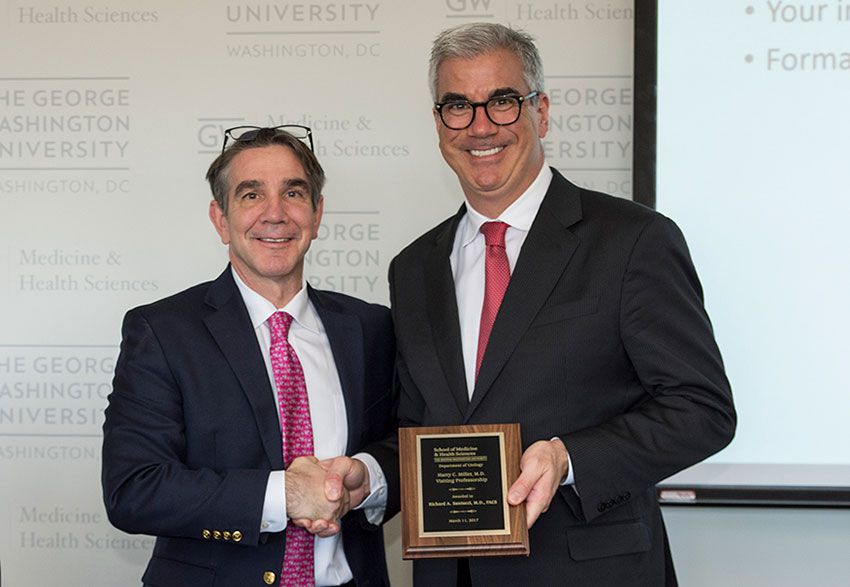
Going into urology as a field of study is like Alice in Wonderland falling down the rabbit hole, said Harry C. Miller, M.D., former chair of the Department of Urology at the George Washington University (GW) School of Medicine and Health Sciences (SMHS). “It’s a whole new universe that you never knew was there.”
Miller, who joined SMHS as professor and chair in 1973 and retired in 1995 as emeritus professor and chair, addressed residents, faculty, students, and alumni at the start of the fourth annual Harry C. Miller Visiting Professorship Symposium and Awards Luncheon on March 11.
“It’s incredible to see what has happened here in the past few years,” Miller said. “Urology is a great field.”
Richard A. Santucci, M.D., FACS, specialist-in-chief of urology at the Detroit Medical Center, director of the Center for Urologic Reconstruction, and clinical professor at Michigan State University College of Osteopathic Medicine, presented two keynotes at the event, “Urethral Stricture: What To Do and How To Do It” and “The Surgical Treatment of Adult Buried Penis: A Growing Problem.”
Daniel Stein, M.D., assistant professor of urology at SMHS, in introducing Santucci, called him “calm, collected, and fearless.”
“His accolades go on and on, and I could tell you all about [them] … but I’d both embarrass him and I’d be here all morning long. I had the privileged of working with him for more than a year, during which I probably spent more time with him than I did with my family. In the operating room, he’s a super surgeon,” Stein said. “He’s a wonderful scientist and a wonderful clinician.”
Santucci, upon taking the stage, thanked the audience members for coming out on a Saturday morning to join in the discussion. He also gave a nod to Thomas Jarrett, M.D., professor and chair of the Department of Urology at SMHS, for his work in the department.
“I’m really pleased to be here,” Santucci said. “I’ve been a fan of Tom Jarrett since I first got to know him around the year 2000, and I was frankly excited when I saw that he was coming down … to be the chairman [at GW].”
For his first keynote, Santucci spoke to the advances made in urology, most specifically urethroplasty. For that surgery, the urethra is reconstructed to cure various problems, including a narrowing of the urethra called urethral stricture.
“When I got out in the year 2000, there were exactly two programs in the country that really taught thorough urethroplasty technique. Now we have something like 13 or even 15 fellowships,” he said.
Urethral strictures are seen every day, Santucci continued, but data surrounding the condition is hard to find. “But if you personally have a urethral stricture, you’re looking at double the health expenditures in any given year, so it’s a real, significant problem,” he said.
Santucci outlined the three best urethroplasty surgeries that will “cover 99.99 percent of patients”: buccal urethroplasty, Johansen's urethroplasty, and pelvis fracture urethral defect urethroplasty.
Before each keynote speech, residents presented case studies to the audience, with Santucci offering his expert advice and opinions on treatments, outcomes, and next steps. Audience members also joined in, opening the doors for conversations on different surgery techniques, possible complications, and in-depth debates on the best treatment options.
Following the keynote addresses and case presentations, the symposium participants gathered for an awards luncheon.


